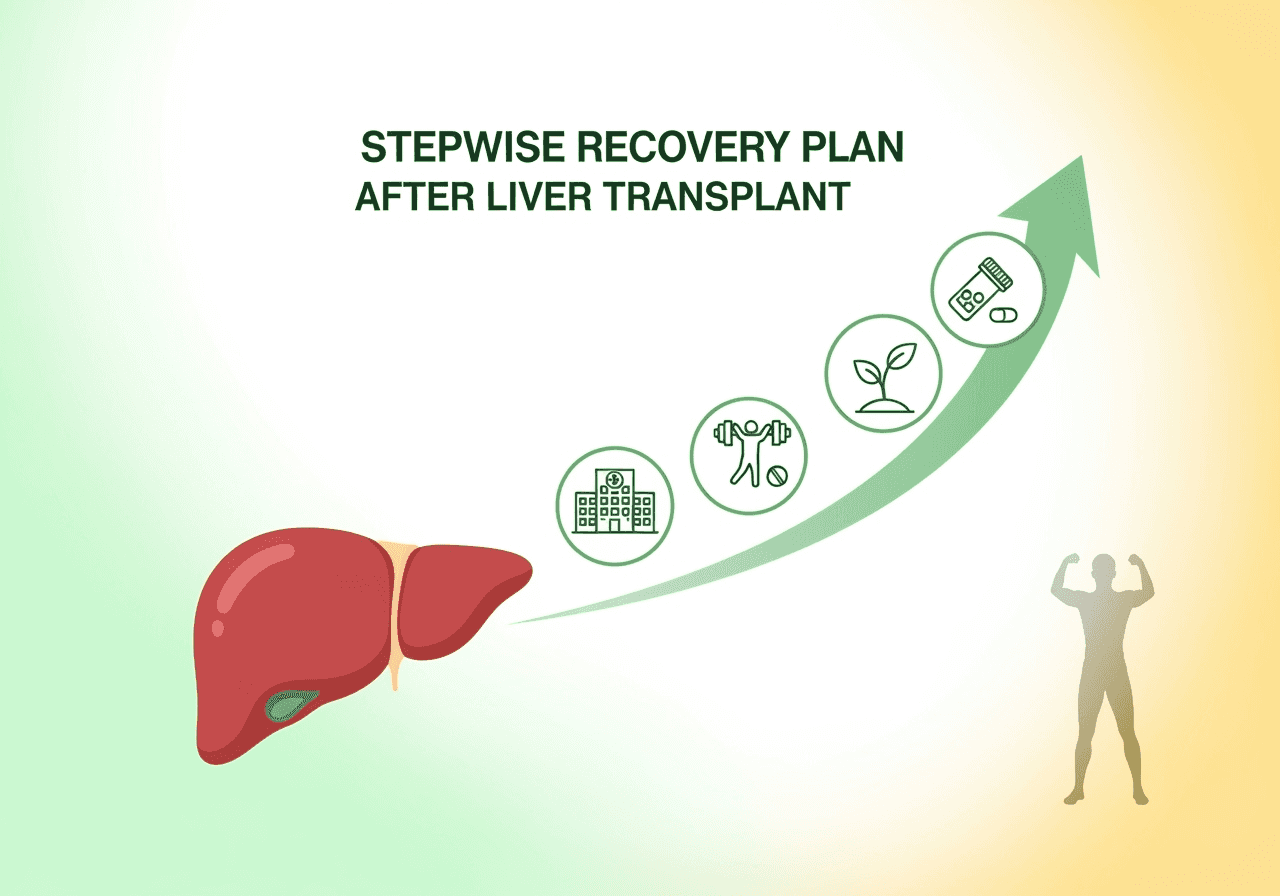
Stepwise Recovery Plan After Liver Transplant
31 Oct, 2025
 Healthtrip
Healthtrip- Where to Consider Liver Transplant: Top Hospitals < li>Why is a Stepwise Recovery Plan Crucial After Liver Transplant?
- Who is Involved in Your Post-Liver Transplant Care Team?
- How Does the Immediate Post-Operative Period Look? < li>How to Manage Long-Term Recovery and Medication?
- Examples of Lifestyle Adjustments Post-Liver Transplant
- Conclusion
Immediate Post-Transplant Phase
The initial days and weeks following your liver transplant are crucial for monitoring the new liver's function and managing any immediate complications, this phase typically involves close supervision in the hospital, where the medical team, potentially including specialists affiliated with facilities like Memorial ?i?li Hospital are vigilant in assessing your body's response to the transplanted organ. Expect frequent blood tests, imaging studies, and clinical evaluations to ensure the liver is functioning correctly and to detect any signs of rejection or infection. Pain management is a priority, and medications will be administered to keep you comfortable. Immunosuppressant drugs are started immediately to prevent your body from rejecting the new liver, and the dosage will be carefully adjusted based on your individual needs and response. During this time, the medical team will also educate you and your caregivers about medication management, potential side effects, and the importance of adherence to the prescribed regimen. Early mobilization, such as gentle walks around the hospital ward, will be encouraged to promote circulation and prevent complications like blood clots and pneumonia. Remember, this is a period of adjustment for both your body and mind, so allow yourself time to rest, heal, and process the experience. Healthtrip can connect you with resources and support groups to help you navigate the emotional aspects of recovery.
Most popular procedures in India
Managing Immunosuppression
Immunosuppressant medications are the cornerstone of preventing organ rejection after a liver transplant, but they also come with potential side effects that require careful management, these medications work by suppressing the immune system, preventing it from attacking the new liver but simultaneously increasing the risk of infections and other complications. The specific drugs and dosages will be tailored to your individual needs by experienced transplant physicians, possibly in consultation with specialists available through Healthtrip's network. Common immunosuppressants include tacrolimus, cyclosporine, mycophenolate mofetil, and steroids, and each has its own set of potential side effects, such as high blood pressure, kidney problems, tremors, and increased susceptibility to infections. Regular blood tests are essential to monitor drug levels and adjust dosages as needed to maintain a balance between preventing rejection and minimizing side effects. It's crucial to adhere strictly to the prescribed medication schedule and never miss a dose, as this can significantly increase the risk of rejection. Be vigilant about recognizing signs of infection, such as fever, chills, cough, or wound drainage, and report them to your healthcare team promptly. Your doctor may also prescribe prophylactic medications to prevent certain infections, such as pneumonia or fungal infections. Healthtrip can provide access to educational resources and support to help you understand your medications and manage potential side effects, ensuring a smoother and more comfortable recovery.
Wellness Treatments
Give yourself the time to relax
Lowest Prices Guaranteed!

Lowest Prices Guaranteed!
Diet and Nutrition
Proper nutrition plays a vital role in your recovery after a liver transplant, helping to rebuild strength, support liver function, and prevent complications. In the immediate post-transplant phase, you may experience a decreased appetite and digestive issues, but it's essential to focus on consuming a balanced diet rich in protein, vitamins, and minerals. A registered dietitian can create a personalized meal plan tailored to your individual needs and preferences, taking into account any dietary restrictions or allergies. Protein is crucial for tissue repair and immune function, so aim to include sources like lean meats, poultry, fish, beans, and tofu in your diet. Choose whole grains, fruits, and vegetables for essential vitamins, minerals, and fiber. Limit your intake of processed foods, sugary drinks, and unhealthy fats, as these can contribute to weight gain and other health problems. Stay well-hydrated by drinking plenty of water throughout the day. If you experience nausea or vomiting, try eating smaller, more frequent meals and avoiding strong odors. Your dietitian can also recommend strategies for managing specific side effects of immunosuppressant medications, such as changes in taste or appetite. Healthtrip can connect you with nutrition experts who can provide ongoing support and guidance to help you optimize your diet and nutrition throughout your recovery journey, wherever you are, whether at home or consulting specialists through facilities like Vejthani Hospital.
Physical Activity and Rehabilitation
Regular physical activity is an integral part of your recovery after a liver transplant, helping to improve strength, endurance, and overall well-being. In the initial weeks after surgery, start with gentle exercises like walking, stretching, and deep breathing to promote circulation and prevent complications. Gradually increase the intensity and duration of your activities as you feel stronger. A physical therapist can develop a personalized exercise program tailored to your individual needs and abilities, focusing on improving muscle strength, balance, and coordination. Aim for at least 30 minutes of moderate-intensity exercise most days of the week, such as brisk walking, cycling, or swimming. Avoid activities that put excessive strain on your abdominal muscles, such as heavy lifting or sit-ups, until your incision has fully healed. Listen to your body and rest when you feel tired or sore. Physical activity can also help to improve your mood, reduce stress, and boost your energy levels. Consider joining a support group or exercise class for transplant recipients to stay motivated and connect with others who understand your experience. Healthtrip can provide access to rehabilitation specialists and fitness resources to help you achieve your physical activity goals and improve your overall quality of life after a liver transplant. Facilities like Fortis Hospital, Noida have comprehensive rehabilitation programs, and Healthtrip can assist in coordinating your care.
Long-Term Monitoring and Follow-Up
Long-term monitoring is essential to ensure the continued health and function of your transplanted liver and to detect any potential complications early on. Regular follow-up appointments with your transplant team are crucial, typically involving blood tests, imaging studies, and clinical evaluations. Blood tests are used to monitor liver function, immunosuppressant drug levels, and overall health. Imaging studies, such as ultrasound or MRI, may be performed periodically to assess the structure and function of the liver. Your transplant team will also monitor you for any signs of rejection, infection, or other complications. It's important to report any new or worsening symptoms to your healthcare team promptly. Adherence to your medication schedule is critical for preventing rejection and maintaining long-term graft survival. Lifestyle modifications, such as maintaining a healthy weight, eating a balanced diet, and avoiding alcohol and tobacco, can also help to protect your liver health. Vaccinations are important to prevent infections, but you should consult with your transplant team before receiving any vaccines, as some may be contraindicated. Regular screening for cancer is also recommended, as immunosuppressant medications can increase the risk of certain types of cancer. Healthtrip can help you find experienced transplant specialists and coordinate your follow-up care, ensuring you receive the ongoing support and monitoring you need to thrive after a liver transplant, whether you choose to remain local or seek specialized care at international centers like the Singapore General Hospital.
Where to Consider Liver Transplant: Top Hospitals
Embarking on the journey of a liver transplant is undoubtedly a significant decision, one that demands careful consideration of various factors, including the expertise of the medical team and the reputation of the healthcare facility. Choosing where to undergo this life-altering procedure isn't just about picking a location; it's about entrusting your well-being to a team capable of navigating the complexities of transplantation with precision and care. Healthtrip understands the importance of this decision and aims to provide you with the information you need to make an informed choice. Across the globe, numerous hospitals have established themselves as leaders in liver transplantation, boasting state-of-the-art facilities, experienced surgeons, and comprehensive post-operative care programs. From bustling metropolitan centers to serene havens of healing, these institutions offer a beacon of hope for individuals seeking a new lease on life. Healthtrip collaborates with several of these top-tier hospitals, facilitating access to world-class medical care for patients seeking liver transplantation abroad. Fortis Memorial Research Institute in Gurgaon, India, for example, is renowned for its comprehensive transplant program and skilled surgeons. Similarly, Memorial Sisli Hospital and LIV Hospital, both located in Istanbul, Turkey, are known for their advanced technology and patient-centric approach to care. In Thailand, Bangkok Hospital and Vejthani Hospital attract patients from across the globe, owing to their expertise in transplantation and commitment to quality. The Saudi German Hospital group, with branches in Cairo, Dammam, and other locations, also provides comprehensive liver transplant services. Selecting the right hospital is a crucial step in your transplant journey, and Healthtrip is here to guide you through the process, ensuring you find a facility that meets your specific needs and offers the best possible outcome. We can help you connect with these hospitals and explore your options, coordinating consultations and providing support every step of the way.
Factors to Consider When Choosing a Hospital
When evaluating potential hospitals for your liver transplant, several key factors should influence your decision. First and foremost, consider the hospital's experience and success rates in liver transplantation. A center with a high volume of transplants and a proven track record of positive outcomes is generally a safer bet. Investigate the qualifications and experience of the transplant surgeons and the entire multidisciplinary team involved in your care. Do they have specialized expertise in your particular condition? What is their approach to patient care and communication? Don't hesitate to ask detailed questions about the hospital's protocols, procedures, and resources. Next, evaluate the hospital's facilities and technology. Does the hospital have state-of-the-art operating rooms, intensive care units, and diagnostic equipment? Is it equipped to handle complex cases and potential complications? Consider the hospital's location and accessibility. Is it easily reachable from your home or place of residence? Are there suitable accommodations available nearby for you and your family? Finally, consider the hospital's cost and insurance coverage. Obtain detailed estimates of the total cost of the transplant, including surgery, hospitalization, medications, and follow-up care. Verify whether your insurance plan covers liver transplantation at the hospital you are considering. Healthtrip can assist you in navigating these complexities, providing information on hospital costs, insurance coverage, and financial assistance options. We can also help you compare different hospitals and weigh the pros and cons of each, empowering you to make a well-informed decision. Remember, choosing the right hospital is a collaborative process, and Healthtrip is here to be your trusted partner every step of the way. We can facilitate communication with the hospital's transplant team, arrange virtual consultations, and provide logistical support to ensure a smooth and stress-free experience.
Why is a Stepwise Recovery Plan Crucial After Liver Transplant?
Undergoing a liver transplant is a monumental step towards reclaiming your health and well-being. However, the surgery itself is only one piece of the puzzle. The post-transplant recovery period is equally crucial, demanding a structured and comprehensive approach to ensure the long-term success of the transplant and your overall health. A stepwise recovery plan, tailored to your individual needs and progress, is essential for navigating the challenges and maximizing the benefits of your new liver. This plan acts as a roadmap, guiding you through each stage of recovery, from the immediate post-operative period to long-term maintenance. It encompasses various aspects of care, including medication management, dietary adjustments, exercise rehabilitation, emotional support, and regular monitoring. Without a well-defined plan, patients may struggle to adhere to their treatment regimen, recognize potential complications, and make necessary lifestyle changes, ultimately jeopardizing the health of their new liver and their own well-being. Healthtrip emphasizes the importance of a stepwise recovery plan and works closely with leading transplant centers to ensure that patients receive personalized and comprehensive post-transplant care. We understand that the recovery journey can be daunting, and we are committed to providing you with the support and resources you need to succeed. Our services include connecting you with experienced transplant coordinators, providing educational materials, and facilitating access to support groups and online communities. We also offer telemedicine consultations, allowing you to connect with your medical team remotely and receive ongoing guidance and support from the comfort of your own home. With Healthtrip by your side, you can confidently navigate the complexities of post-transplant recovery and embrace a healthier, more fulfilling life.
The Components of a Comprehensive Stepwise Recovery Plan
A well-structured stepwise recovery plan after a liver transplant should encompass several key components to ensure optimal outcomes. First and foremost, meticulous medication management is paramount. Immunosuppressant medications are essential for preventing organ rejection, and adhering to the prescribed dosage and schedule is critical. Your recovery plan should include detailed instructions on medication usage, potential side effects, and strategies for managing them. Regular monitoring of medication levels is also necessary to ensure that the dosage is appropriate and effective. Dietary adjustments are another crucial aspect of the recovery plan. Following a healthy, balanced diet that is low in fat and sodium is essential for maintaining liver health and preventing complications. Your recovery plan should include guidance on optimal food choices, portion sizes, and meal planning. Exercise rehabilitation is also an important component of the recovery plan. Regular physical activity can help improve your strength, endurance, and overall fitness. Your recovery plan should include a gradual exercise program that is tailored to your individual abilities and limitations. Emotional support is also essential for navigating the psychological challenges of post-transplant recovery. Your recovery plan should include access to counseling, support groups, and other resources to help you cope with stress, anxiety, and depression. Regular monitoring is also necessary to detect and address any potential complications early on. Your recovery plan should include scheduled follow-up appointments with your transplant team, as well as instructions on when to seek immediate medical attention. Healthtrip can assist you in developing a comprehensive stepwise recovery plan that addresses all of these key components. We can connect you with experienced transplant specialists, provide personalized guidance, and offer ongoing support to ensure that you achieve your recovery goals. Our commitment is to empower you to take control of your health and live a long and fulfilling life after your liver transplant.
Who is Involved in Your Post-Liver Transplant Care Team?
The journey after a liver transplant is a collaborative effort, with a dedicated team of healthcare professionals working together to ensure your well-being. This multidisciplinary team plays a vital role in guiding you through the recovery process, monitoring your progress, and addressing any challenges that may arise. Understanding the roles and responsibilities of each member of your care team is crucial for effective communication and shared decision-making. Your post-liver transplant care team typically includes transplant surgeons, hepatologists, transplant coordinators, nurses, dietitians, social workers, and pharmacists. Each member brings their unique expertise to the table, providing comprehensive care that addresses your physical, emotional, and social needs. The transplant surgeon is responsible for performing the surgery and overseeing your immediate post-operative care. The hepatologist specializes in liver diseases and manages your long-term liver health. The transplant coordinator serves as your primary point of contact, coordinating your care and navigating the complexities of the transplant process. Nurses play a vital role in monitoring your vital signs, administering medications, and providing education and support. Dietitians help you develop a healthy eating plan that supports your liver health and overall well-being. Social workers provide emotional support and connect you with resources to address any social or financial challenges you may face. Pharmacists ensure that you receive the correct medications and understand how to take them safely. Healthtrip recognizes the importance of a strong and cohesive care team and works with leading transplant centers that prioritize a multidisciplinary approach to care. We can help you connect with experienced and compassionate healthcare professionals who are dedicated to your well-being. Our services include facilitating communication with your care team, providing access to educational materials, and offering ongoing support throughout your recovery journey. With Healthtrip by your side, you can be confident that you are receiving the best possible care from a team that is committed to your success.
The Role of Each Team Member in Detail
Delving deeper into the roles of each member of your post-liver transplant care team provides a clearer understanding of their specific contributions to your recovery. The transplant surgeon, beyond performing the initial operation, is responsible for managing any surgical complications and ensuring the proper functioning of the new liver in the immediate aftermath. They work closely with the hepatologist to monitor liver function tests and adjust medications as needed. The hepatologist, as the liver specialist, is your long-term medical manager, overseeing your immunosuppressant therapy, monitoring for signs of rejection or infection, and addressing any liver-related issues that may arise. They are also responsible for managing any underlying liver disease that may have contributed to the need for a transplant. The transplant coordinator is your advocate and navigator, coordinating appointments, communicating with insurance companies, and providing emotional support. They are your go-to person for any questions or concerns you may have. Nurses provide hands-on care, monitoring your vital signs, administering medications, and educating you on self-care techniques. They are also responsible for recognizing and reporting any signs of complications. Dietitians play a crucial role in helping you develop a healthy eating plan that meets your nutritional needs and supports your liver health. They can provide guidance on meal planning, portion control, and food safety. Social workers provide emotional support and connect you with resources to address any social or financial challenges you may face. They can also help you navigate the complexities of the healthcare system. Pharmacists ensure that you receive the correct medications and understand how to take them safely. They can also answer any questions you may have about your medications. Healthtrip understands the importance of clear communication and collaboration among all members of your care team. We can facilitate regular team meetings, provide access to online communication platforms, and offer ongoing support to ensure that you are well-informed and actively involved in your care. Our goal is to empower you to be an active participant in your recovery journey and to work collaboratively with your care team to achieve the best possible outcomes. We can assist in connecting you with hospitals such as Fortis Memorial Research Institute, Max Healthcare Saket, Bangkok Hospital, Vejthani Hospital, Memorial Sisli Hospital, Liv Hospital and the Saudi German Hospital group, offering comprehensive and multidisciplinary post-transplant care.
Also Read:
How Does the Immediate Post-Operative Period Look?
The immediate aftermath of a liver transplant is a whirlwind of activity, a delicate dance between your body adapting to its new tenant and the medical team ensuring everything goes smoothly. Imagine waking up in the intensive care unit (ICU), perhaps feeling a little groggy and disoriented. Don't worry, that's perfectly normal! You'll be closely monitored, with a symphony of machines beeping and whirring around you. These aren't just there for show; they're keeping a close eye on your vital signs – heart rate, blood pressure, oxygen levels – ensuring your new liver is functioning as it should. Pain management will be a top priority, with medications administered to keep you comfortable. You might have a few tubes and lines attached, including a catheter to drain urine and a drain near the incision site to remove any excess fluid. These are all temporary measures, designed to aid your recovery. The medical staff will encourage you to take deep breaths and cough regularly to prevent pneumonia, which can sometimes occur after surgery. It's a team effort, and every little action you take contributes to a smoother, faster recovery. Think of this period as a crucial first step on your journey to renewed health, a time of careful observation and expert care. Hospitals like Fortis Memorial Research Institute, Gurgaon and Memorial Sisli Hospital offer excellent post-operative care facilities, emphasizing patient comfort and meticulous monitoring.
Also Read:
How to Manage Long-Term Recovery and Medication?
The journey after a liver transplant doesn't end when you leave the hospital; it's a marathon, not a sprint! Long-term recovery is all about consistent management, primarily revolving around adhering to your medication regimen and making healthy lifestyle choices. Immunosuppressant drugs are the cornerstone of your post-transplant life, preventing your body from rejecting the new liver. It's crucial to understand these medications, their purpose, and potential side effects. Never, ever skip a dose or alter the dosage without consulting your transplant team. Consistency is key! Side effects can vary from person to person, ranging from mild annoyances to more significant concerns. Open communication with your medical team is essential to manage these effectively. They might adjust dosages, add other medications, or suggest lifestyle modifications to minimize any adverse effects. Regular blood tests will become a routine part of your life, monitoring your liver function and drug levels. These tests help the team fine-tune your medication to achieve the optimal balance between preventing rejection and minimizing side effects. It can feel overwhelming at times, but remember you're not alone. Your transplant team is there to guide you every step of the way, providing support and expertise to help you navigate this new chapter. Hospitals like Vejthani Hospital and Saudi German Hospital Cairo, Egypt prioritize patient education and long-term follow-up care, ensuring you have the resources you need to thrive.
Also Read:
Examples of Lifestyle Adjustments Post-Liver Transplant
Life after a liver transplant offers a fresh start, an opportunity to embrace healthier habits and fully appreciate your renewed well-being. Lifestyle adjustments are a vital part of maintaining long-term health and ensuring your transplanted liver functions optimally. Think of it as a chance to become the best version of yourself! Diet plays a crucial role. A balanced, nutritious diet supports liver health and boosts your immune system. Focus on lean proteins, whole grains, fruits, and vegetables. Your transplant team will likely recommend a specific dietary plan tailored to your individual needs. Avoid processed foods, excessive sugar, and unhealthy fats, as these can put extra strain on your liver. Alcohol is a definite no-no. It can damage your new liver and interfere with your medications. Exercise is another cornerstone of a healthy lifestyle. Regular physical activity helps maintain a healthy weight, strengthens your immune system, and improves your overall well-being. Start slowly and gradually increase the intensity and duration of your workouts. Walking, swimming, and cycling are excellent options. Sun protection is also essential, as immunosuppressant medications can increase your risk of skin cancer. Wear protective clothing, use sunscreen with a high SPF, and avoid prolonged sun exposure. Emotional well-being is just as important as physical health. Stress can weaken your immune system, so find healthy ways to manage stress, such as yoga, meditation, or spending time in nature. Connecting with other transplant recipients can also provide valuable support and understanding. Remember, small changes can make a big difference in your long run. Facilities like Bangkok Hospital and Quironsalud Hospital Murcia offer comprehensive support services to help you adapt to these lifestyle adjustments.
Also Read:
Conclusion
Undergoing a liver transplant is a life-altering experience, marking the beginning of a new chapter filled with both challenges and opportunities. Remember that this journey is a testament to your resilience and determination, and with the right support and guidance, you can thrive. The key to long-term success lies in understanding your medications, making healthy lifestyle choices, and maintaining open communication with your transplant team. While it may seem daunting at times, know that you are not alone. Healthtrip is here to support you every step of the way, connecting you with top hospitals and healthcare professionals worldwide, such as Fortis Hospital, Noida and LIV Hospital, Istanbul who specialize in liver transplantation and offer comprehensive post-transplant care. We understand the importance of personalized care and strive to provide you with the resources and information you need to make informed decisions about your health. Embrace this new beginning, celebrate your progress, and never hesitate to reach out for help when you need it. With dedication and a positive mindset, you can live a long, fulfilling life after a liver transplant. Your health journey is our priority, and we are committed to helping you achieve your best possible outcome. Let Healthtrip be your trusted partner in navigating the path to renewed health and well-being.
Related Blogs

Long-Term Follow-Up After Eye Surgery
Detailed insights into eye surgery – doctors, hospitals, technology, recovery,

Healthtrip’s Transparency in Eye Surgery Pricing and Packages
Detailed insights into eye surgery – doctors, hospitals, technology, recovery,

Frequently Asked Questions About Eye Surgery
Detailed insights into eye surgery – doctors, hospitals, technology, recovery,

Advanced Robotic Technology Used in Eye Surgery
Detailed insights into eye surgery – doctors, hospitals, technology, recovery,

How Healthtrip Supports Foreign Patients for Eye Surgery in India
Detailed insights into eye surgery – doctors, hospitals, technology, recovery,

Top Medical Packages for Eye Surgery Offered by Healthtrip
Detailed insights into eye surgery – doctors, hospitals, technology, recovery,










